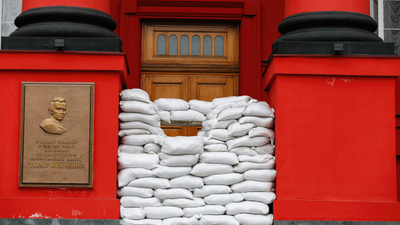
It’s been nearly two years since Russia first invaded Ukraine, and in that time, the country’s research community has been left utterly decimated.
That’s the conclusion of new research published this month in the journal Humanities and Social Sciences Communications. In 2020, Ukraine contributed one in every 20 of the top 10% most-cited academic research papers in the world. The Organization for Economic Co-operation and Development said Ukraine’s scientific output was stronger than average in key fields like computer science and energy, while its engineering sector and earth and planetary sciences were among the world’s best.
But that’s changed in the years since the outbreak of war with Russia, a bloody saga that’s left hundreds of thousands dead and millions more displaced. The Humanities and Social Sciences Communications study found that Ukraine has lost around 20% of its total scientific capacity.
Gaétan de Rassenfosse, an economist at the École Polytechnique Fédérale de Lausanne in Switzerland and lead author on the study, cites a few reasons for the massive drop-off. One is the number of displaced migrants from Ukraine forced to flee their country as it turned into a war zone: Some 8 million Ukrainians are now no longer in their home country as a result of war. Those who remain in Ukraine must now struggle to find equipment—and brain space—to conduct their research while friends wage war in the backdrop.
“[Some] could not perform experiments because of electricity shutdowns,” de Rassenfosse says. “Others had their university destroyed. Others were displaced entirely. There were massive disruptions.”
In total, around 18.5% of Ukraine’s scientists have left the country, according to the survey of 2,559 people. A colleague of de Rassenfosse’s is actually among the displaced (though she did not take part in the data collection or analysis). Olena Iarmosh had been working as an associate professor working in the eastern Ukrainian city of Kharkiv for 16 years before Russians invaded. Kharkiv is just under 25 miles away from the Russian border; Iarmosh immediately felt unsafe and has since fled to Switzerland.
“Ukrainians are quite heartbroken people,” Iarmosh says. “They’re always full of ideas and ready to initiate good things.” Even though Iarmosh was a relatively high-ranking member of the academic world in Ukraine before the invasion, she has struggled to find commensurate work in Switzerland and is now working at the University of Lausanne in Switzerland on a temporary contract. Her situation is not unique: Only 14% of the Ukrainian researchers surveyed for the Humanities and Social Sciences Communications research had managed to secure a long-term contract in their new host country.
According to the study, those who were more productive and research-active, as measured by their scientific outputs before the invasion, were most likely to have left the country—meaning that their new, more precarious roles outside the country could compound the loss of scientific knowledge.
Things are scarcely better for those who stayed behind. In total, around 15% of those surveyed who said they remained within Ukraine’s borders no longer work on research. “When you zoom into what I like to call the silent majority, the majority of scientists who actually stayed in Ukraine, then you realize many first left academia and research,” says de Rassenfosse. “Some did not, but primarily focused on teaching, because they could do so online.”
Many of those who have stayed have lost access to equipment to conduct their research, while one in five literally cannot go into their workplace anymore because it has either been destroyed or access is too dangerous. The stresses and strain of war are also making an impact: The average time a scientist spends on their research work each week has dropped from 13 hours to 10 hours. “It may not seem a lot, but multiplied by the number of weeks and by the thousands of researchers, that’s like hundreds of thousands of hours of research that’s just gone,” says de Rassenfosse.
However, the results of the survey shows not everyone has drawn down their time studying and producing new research. A small proportion have upped the amount of time they spend on their research insights—which de Rassenfosse says is because they’re trying to avoid the real horror of their situation. “In the survey, they’ve said: ‘I actually do much more research than before because doing research allows me to escape reality.’ ”
Those who are able to continue their work will be key to Ukraine’s eventual recovery, de Rassenfosse adds. “We know that the long-term growth of a country is driven by science and innovation,” he says.